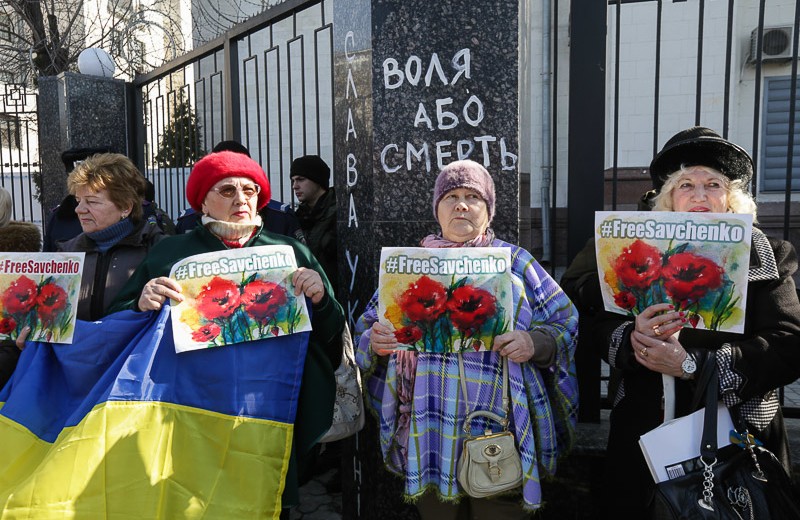But it should also serve to remind Ukrainians what we are fighting for — to rise above the depths that Russia has stooped to.
During the final days of the “trial” against Savchenko, the entire Russian power vertical in miniature was on display in Donetsk, the town in Russia’s Rostov where the trial was held. Military and security services, intelligence agencies, soldiers, bearded Cossacks and dedicated fans of Novorossiya all herded together to create the propaganda imagery required by Kremlin media.
For Ukrainian diplomats, it was a strange scene. When a truck with Russian soldiers drove by us towards the border, our fatigue caused by a 20-hour trip from Kyiv vanished. But the Ukrainian consuls were accustomed to seeing such vehicles. The diplomats had been attending Savchenko’s trial for six months, so they knew the town inside and out, including the seized border with the self-proclaimed ‘Luhansk People’s Republic.’
“Why would one need two towns named Donetsk at all?” asked the MPs who had come to the small border town for the first time. “The town’s name used to be Gundorovka,” said one of the consuls. “Gundorovka suits this town much better,” eight MPs said in unison with the president’s presssecretary, Sviatoslav Tseholko.
Russian authorities decided to dress the final stage of the trial in second-rate film fashion: a tiny building was encircled by armed special task forces, police and Cossacks. A dozen men with assault rifles and court enforcement officers firmly blocked passage to the main courtroom. They decided whether or not a person should be admitted based only on their own personal preferences. Anyone wishing to go out had to get a special permit from one of the armed men.
Before one was able to enter the room where Savchenko’s trial was held, he had to go through the first security check outside, then another one upon entering the premises, then one more in the lobby and a final one at the door of courtroom No. 11. The room itself was tiny. The adjacent room, No. 10, was much bigger. There were only eight three-seat benches for 24 people in the room where the case was heard. Only seven benches were left the following day. Apparently they considered 24 pairs of ears to be too many.
Those who wished to attend the hearing crowded at the entrance of the small room.
Two plain-clothed FSB operatives orders to a colonel on whom to admit and whom to deny. I got talking to him later and asked whether he felt ashamed for his country as it buried nameless soldiers in Donetsk steppes, did nothing to release prisoners and, even worse, did not acknowledge its own people. He thought hard, then simply said it was a delicate political issue.
Having quickly filled the courtroom with people they saw fit, Russian court enforcement officers left the majority of Ukrainian MPs and European diplomats behind the door. Responding to our indignation, they said: “Don’t make a fuss, you’re not at Maidan.” We had to listen to the verdict while standing in the aisle.
The trial both in Moscow and in Rostov lacked distinction. The court rejected all of the defense lawyers’ arguments, such as documents from PACE supporting Savchenko’s immunity from prosecution or expert testimony proving that Savchenko was not in the area of the Russian journalists’ death, as she had already been taken captive. On the other hand, militants’ testimony (“Savchenko behaved defiantly, like a typical Banderite”) served as proof of her guilt.
What happened next has already gotten laughs around the world. The judge, Leonid Stepanenko, responded to laughter in the courtroom like a strict teacher: “If anyone finds this funny, they can leave the courtroom.” Savchenko reacted instantly: “I find this funny.” The judge, a man with a Ukrainian surname, was unlikely to understand Savchenko’s remark in the Ukrainian language, let alone the humor of the situation or the historic moment. He was, after all, busy administering Russian justice.
Frankly speaking, there is not much difference between the Ukrainian and Russian judicial systems so far; corruption and incompetence are the same wherever they happen. But for all that, Russian people show no signs of rejecting such “justice.” They are not disgusted with the crackdown on human rights or blatant disrespect towards the legislation of their own country.
Seeing this makes it all the more striking when you return home from Russia and realize exactly what is being fought for in Ukraine. Institutes that protect human rights and not the orders of the regime must be used to counter totalitarian discipline and order. We still have a long and hard way to go. Judicial reform, legislative reform and law enforcement agencies reform are not just items to be ticked off in a list. They are vitally important transformations to make sure the words written by the second president of Ukraine 13 years ago finally became true: Ukraine is not Russia.
First published by Novoe Vremya on March 25, 2016



